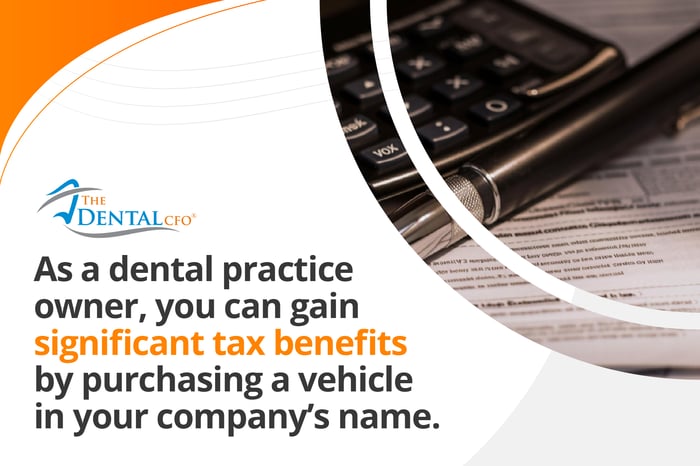AUTHOR: The Dental CFO
March 28, 2024
If you’ve been considering purchasing a company car for your dental practice or want to know more about the process, this blog is for you. Below, we’ve detailed what you need to consider from a purchasing and tax perspective.
What Is a Company Car?
A company car is a vehicle that is owned, leased, or provided by a business for the use of its employees. These cars are typically intended for business-related purposes, such as commuting to and from work, attending meetings, or carrying out other work-related tasks.
Benefits of Buying a Company Car for Dental Practice Owners
Purchasing a company car for a dental practice can offer several benefits for practice owners. Here are some advantages to consider:
Tax Deductions
Depending on the tax regulations in your region, owning a company car may offer tax benefits. Business-related expenses, such as fuel, maintenance, and depreciation, may be eligible for tax deductions, reducing the overall tax liability for the dental practice.

Local regulations and tax laws may vary, so it's advisable to consult with a financial advisor or tax professional to fully understand the potential benefits in your specific situation.
What Is Depreciation?
Depreciation refers to the expensing of a significant asset, like a car, over a specific timeframe. The Internal Revenue Service (IRS) uses different classes for assets, with each class being assigned a term. Most cars get a depreciation term of 5 years under IRS depreciation rules.
However, the depreciation rules vary depending on both the weight and usage of the vehicle. Heavy vehicles tend to have the highest tax deductions, whereas passenger vehicles typically don’t have as many tax deductions.
The depreciation deduction is based on the percentage of business use. Keep in mind that you may have to reimburse the IRS if you fall below 50% of business usage in a calendar year.
Cost Control
Owning a company car allows for better control over transportation costs. With a dedicated vehicle, you can manage and predict expenses related to maintenance, fuel, and insurance, helping in budgeting and financial planning.
Convenience
Having a company car provides convenience for dental practice owners and employees, allowing them to manage their time more efficiently. It eliminates the need to rely on public transportation or personal vehicles, reducing potential delays and ensuring punctuality for appointments and commitments.
In case of dental emergencies or urgent situations, having a company car enables practitioners to respond quickly and efficiently. This can be crucial in providing timely care and maintaining patient trust.
Marketing
A branded company car serves as a mobile marketing tool. It helps in promoting the dental practice as the car travels between locations, increasing visibility and creating awareness in the community.
A well-maintained company car also contributes to a professional image for the dental practice. It can enhance the reputation of the practice and instill confidence in patients, reflecting a commitment to quality and reliability.
Employee Satisfaction
Providing a company car as part of the employment package can enhance job satisfaction for dental practitioners. It can be considered a valuable perk, contributing to the overall well-being and motivation of the dental team.
What to Consider Before Buying a Company Car
Documentation
If you’re considering purchasing a company car, it should be bought in the company’s name. The practice’s name should be present on the car’s insurance, registration, and vehicle title.
It’s recommended that you consider taking a loan through your business for this purchase rather than relying on your personal credit. Purchasing in your company’s name legitimizes the purchase through a business rather than an individual, something the IRS will consider.
Vehicle Size and Type
The vehicle’s weight and size are significant when buying a company car, as they will determine if you can receive an immediate deduction or if you’ll receive your deduction over time. Consider what’s best for your business needs based on the kind of travel you would use a company vehicle for.
Suppose you need or can afford a vehicle that weighs more than 6,000 pounds. In that case, you can expense the entire cost in the year of purchase instead of depreciating over multiple tax years (assuming 100% business use).
The IRS defines a “luxury vehicle” as a four-wheeled vehicle with an unloaded gross weight of 6,000 pounds or less. A luxury vehicle’s cost will be depreciated over a time frame of 5 years. The IRS sets the actual amount you can depreciate annually, which varies slightly depending on your vehicle and usage.
Business vs Personal Usage
Can you use a company car for personal use? In many cases, yes. But you will need to prove that the car is being used for business purposes more than 50% of the time. This provides an additional layer of protection from an IRS audit. Logging your mileage will help, but it’s important to keep a record of where you’re traveling to.

Business use can include but is not limited to driving between practice locations, traveling to meetings, conferences, and other professional activities, and buying and transporting supplies and equipment.
The IRS defines personal use of a car to include commuting miles, which would be home to work sites and then back home. It is paramount that you differentiate between personal and business usage by diligently logging your miles.
Tax returns that may have seemingly lofty mileage deductions and business percentages are something the IRS may flag. Having your miles correctly logged and split into categories will help you document your eligibility for valuable deductions relevant to your usage and car type.
What Documentation Does the IRS Require for a Company Car?
Diligent recordkeeping will surely speed up the tax filing process and help keep the IRS at bay. We cannot stress this enough: You need to prove that you are using your vehicle predominantly for business, which can be done by adequately logging your mileage.
Additionally, substantiating the costs of operating and maintaining the car over time will aid you come tax season. Keep all receipts related to using and servicing the vehicle.
Using a company account to pay these expenses whenever possible simplifies recordkeeping. If you must use personal cards or cash in these situations, be sure to keep your receipts as a paper trail so you can reference these purchases with proper documentation.
Mileage logs are essential to prove business usage. Even if you are using the vehicle 100% for business, using a mileage logging app can help you log your miles and differentiate your total miles driven from commuting miles, business trips, and personal trips. The more detailed you can be with your usage, the more likely you are to receive deductions.
The Dental CFO Can Help You Maximize Your Use of a Company Car
There’s a lot to consider when thinking through the purchase of a vehicle for business use.
Our credentialed tax professionals have years of experience in working with nuances in the dental tax niche. They can ensure you’re paying the least while making the most, giving you the ability to focus on your patients instead of bookkeeping, tax preparation, and financial management.
If you’re thinking about buying a company car, know that The Dental CFO has a firm grasp on the stipulations set by the IRS and how you can make the most of every business asset, including your company car.
To set you up for success and deliver the guidance you need to make the most of your purchase, we’ve created a detailed breakdown of all the considerations you need to understand before making your purchase in our free eBook.

